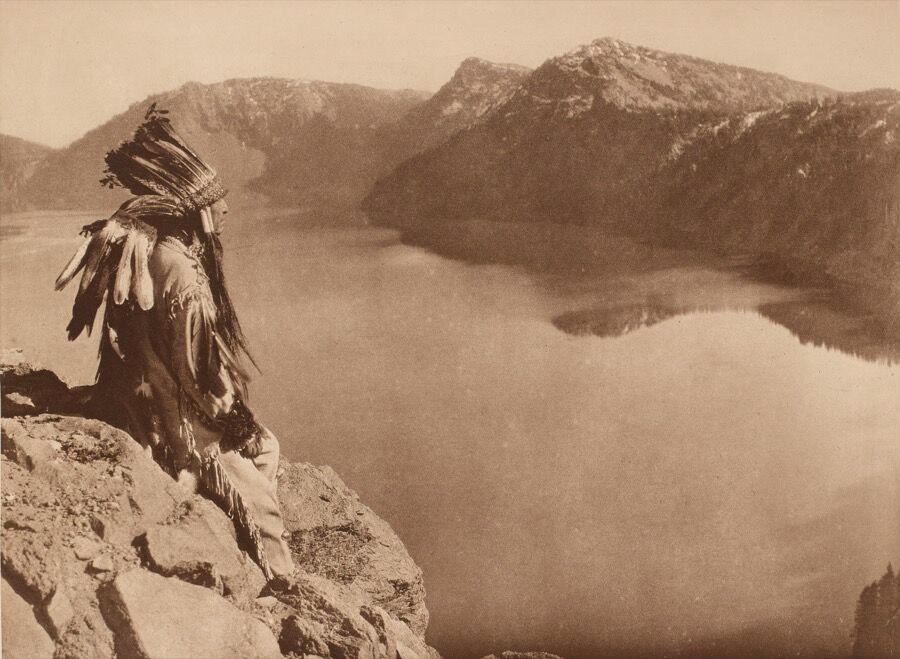Curtis, Crater Lake, 1923
The word "listen" is often used to begin a story. Every story needs a storyteller and a story-listener, because while the one offers the necessary words, the other gives the necessary silence. Children were traditionally taught to pay similar attention to the land, "to listen intently when all seemingly was quiet," in the words of Luther Standing Bear. Listening lets the outer world be re-created within you. Listening means being willing to let one's borders be porous. Listening does what light does for a seed, asking it to swing upwards into life and giving it a reason to do so. "Listen, and you will hear the patterns of life. Are they the same, or is there a change in the sounds?" is how the Ojibwa storyteller Ignatia Broker describes an early lesson for a child, adding that children were encouraged to listen to an older person before they spoke themselves. Inuit people were happier with children who took their time learning to talk because listening was the skill needed to to learn fast: speaking could wait.
To get the attention of a child, you can shout "Shut up!" or you can normally say "Listen!" When children want other children to hear them, they generally say "Listen!" And it normally works. Moreover, there is a different quality of attention given in response: "Shut up!" may provoke resentful attention while "Listen!" may invite an unguarded curiosity. Demanding someone's silence is one thing; offering your own is another. I remember disliking -- to the point of fury -- silence being imposed on us, but being spellbound by self-willed silence, breathing in silver air, mirrored as water.
"Silence, love, reverence -- this is the trinity of first lessons," says Charles Eastman, on the trivium of the Native American Ohiyesa people. Silence is "the sign of perfect equilibrium. Silence is the absolute poise or balance of body, mind, and spirit."
If silence is revered, words are honored. From the moment children begin to speak, they are taught to respect speech, "how to use the word and how not to use it," says Henry Old Coyote (Crow). "The word is all-powerful, because it can build a man up, but it can also tear him down. That's how powerful it is. So a child is taught to use words tenderly and never against anyone."
Jay Griffiths, from Kith: The Riddle of the Childscape
The word "listen" is often used to begin a story. Every story needs a storyteller and a story-listener, because while the one offers the necessary words, the other gives the necessary silence. Children were traditionally taught to pay similar attention to the land, "to listen intently when all seemingly was quiet," in the words of Luther Standing Bear. Listening lets the outer world be re-created within you. Listening means being willing to let one's borders be porous. Listening does what light does for a seed, asking it to swing upwards into life and giving it a reason to do so. "Listen, and you will hear the patterns of life. Are they the same, or is there a change in the sounds?" is how the Ojibwa storyteller Ignatia Broker describes an early lesson for a child, adding that children were encouraged to listen to an older person before they spoke themselves. Inuit people were happier with children who took their time learning to talk because listening was the skill needed to to learn fast: speaking could wait.
To get the attention of a child, you can shout "Shut up!" or you can normally say "Listen!" When children want other children to hear them, they generally say "Listen!" And it normally works. Moreover, there is a different quality of attention given in response: "Shut up!" may provoke resentful attention while "Listen!" may invite an unguarded curiosity. Demanding someone's silence is one thing; offering your own is another. I remember disliking -- to the point of fury -- silence being imposed on us, but being spellbound by self-willed silence, breathing in silver air, mirrored as water.
"Silence, love, reverence -- this is the trinity of first lessons," says Charles Eastman, on the trivium of the Native American Ohiyesa people. Silence is "the sign of perfect equilibrium. Silence is the absolute poise or balance of body, mind, and spirit."
If silence is revered, words are honored. From the moment children begin to speak, they are taught to respect speech, "how to use the word and how not to use it," says Henry Old Coyote (Crow). "The word is all-powerful, because it can build a man up, but it can also tear him down. That's how powerful it is. So a child is taught to use words tenderly and never against anyone."
Jay Griffiths, from Kith: The Riddle of the Childscape












































































































































































No comments:
Post a Comment